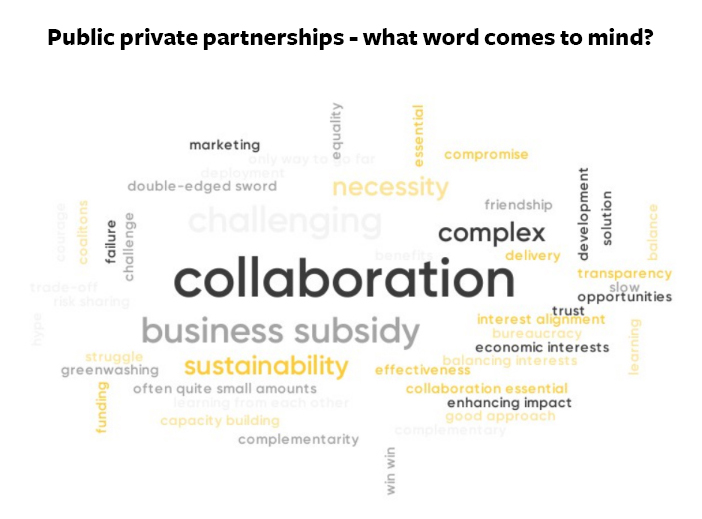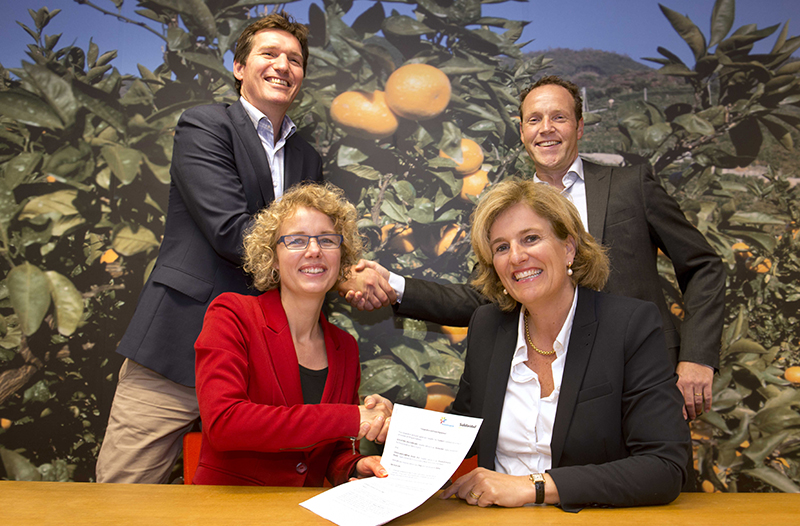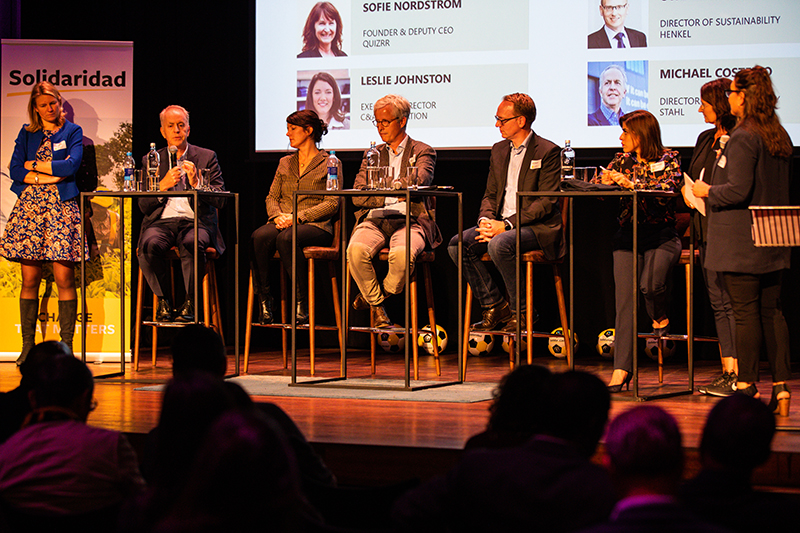Company subsidies or honest intentions?
At the beginning of the discussion, the audience is asked what word comes to mind when thinking about Public Private Partnerships (PPP’s). The public gives feedback directly through the mobile app Mentimeter. Words as collaboration and sustainability are filled in. But also a lot of words like greenwashing, business subsidies and complex. Moderator Michaelyn Baur, Managing Director of Solidaridad Central America, gave the floor to the panel members to elaborate.
Uwe Bergmann, director of sustainability at Henkel, explained why his company got involved in a partnership with Solidaridad: ‘Palm oil is a product that gets used in great amounts in our products. However, we are seeing an increasing resistance to the product, because of the issue of deforestation that occurs in the supply chain. Green brands proudly state they are ‘palm oil free’. As a result, producers switch to other oils, which actually use up more land. We want to be part of the solution in the value chain by using sustainable palm oil and increasing its acceptance by society.’
The reasoning of Stahl, a leather chemicals supplier, to get involved in a partnership is comparable. Michael Costello, director of sustainability, elaborated: ‘We want to open up the supply chain and see what is happening. That involves more than just supplying tanning chemicals, which is our core business. We want to limit the pollution caused in the chain, but we need the input from the public sector and NGOs. They can do things on the ground we are not able to do as a private company.’

The benefits for corporations
Are companies afraid that their competitors will pick the fruits of their labour in the partnership? Michaelyn Baur asked Rutger Groot, supervisory board member of East-West Seed and chairman of the East-West Seed Knowledge Transfer Foundation. ‘We provide vegetable seeds to farmers in the tropics. To do that, we have to train them, it is the only way to penetrate the market. It is our goal to improve the livelihoods of the farmers. And yes, competitors can come in and benefit from the training we have organized. If they have better seeds, they win. If we have better seeds, we win. It is a fair market. But so far it has been a win-win approach for both farmers and East-West Seed.’
94% percent of the audience was of the opinion that a company would only get involved in a PPP when there is a business case. In reaction to this, Costello stated that a business case does not necessarily have to be about profit. ‘Our first effort had a million dollar budget, with the only aim being to decrease pollution.’
Bergmann, in turn, considers the benefits for Henkel in the long term, and explained it so: ‘In a way, it is about our competitiveness, because we are working on keeping palm oil in the supply chain.’
The cascade effect
Working in public private partnerships is a difficult process that requires long-term commitment from all parties involved. Susana Siekavizza, executive director of Grepalma, thinks that it is worth it: ‘When partnerships are successful and show a new, more sustainable way of working, this can create a cascade effect in the sector.’
To trigger this cascade effect, it is necessary to share information about the results of the PPP. Tanja Gonggrijp of the Ministry of Foreign Affairs emphasized that it should never be about the private interests of a company. ‘It is not about the private interests of a company, so we can share the knowledge gained. We can prevent others from making the same mistakes. Information should be public and employ learning opportunities.’ Rutger Groot added to this: ‘We need to measure our results and be critical. If it is not working, we should not be afraid to close it down. But if it works, we should scale it up.’
Sofie Nordström is the founder of QuizRR, a company producing online trainings based on customized film dramas, followed by quiz questions. It is a tool to educate workers about their rights and more sustainable ways of working. ‘We are a for-profit company and are as a result met with suspicion sometimes, but our company can scale up the work we all know is necessary. However, we need to cooperate with governments and organizations to get the right content; we are not experts on everything. Together we can create lasting change.’
Mutual interests towards sustainable results
When asked about the statement about PPPs providing subsidies to companies, Tanja Gonggrijp answered firmly: ‘No, that is not what we do. As a government, we can work with other governments to change the rules and regulations, for example. But to create change in the supply chain, we need to work on other levels as well. We want to work on the sustainable development goals and we cannot do that on our own.’
Leslie Johnson, executive director of the C&A Foundation, expressed the opinion that the involvement of civil society organizations in PPPs is crucial to get results. ‘The demand for organic cotton is high, but it is only a small percentage of the total production. We have to work with local governments and we need a neutral party like Solidaridad to bring everybody together.’
Moderator Michaelyn Baur concluded the session by putting forward that the audience’s views on PPPs seemed to have become more favourable than at the beginning of the discussion. In addition to that, Tanja Gonggrijp reminded everybody of the following: ‘PPPs are not the future. They are one of the instruments we need to work towards a more sustainable future. And we have hardly any time, just look at the science about climate change. So keep working. Keep learning. Speed up.’


